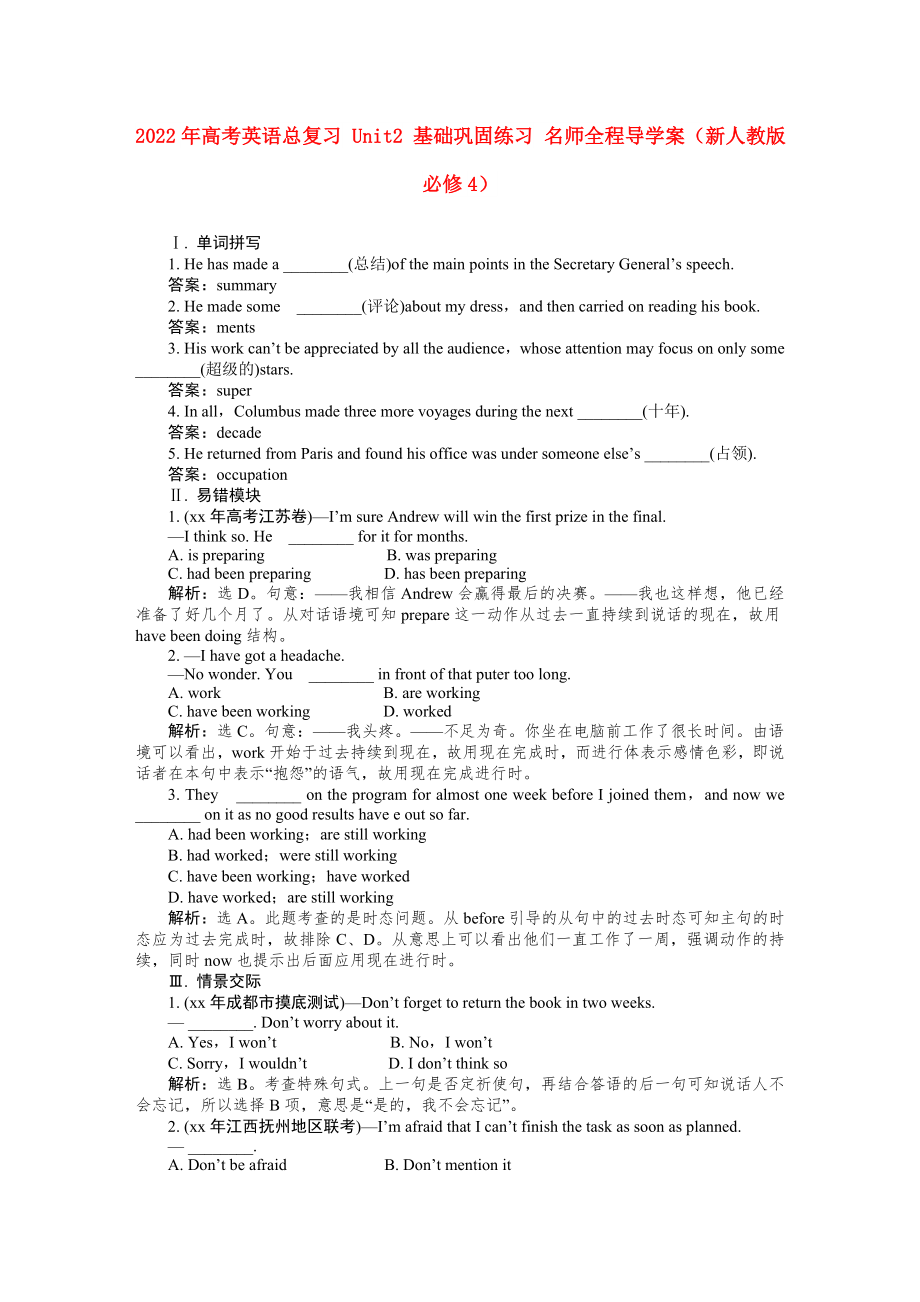《2022年高考英語(yǔ)總復(fù)習(xí) Unit2 基礎(chǔ)鞏固練習(xí) 名師全程導(dǎo)學(xué)案(新人教版必修4)》由會(huì)員分享,可在線閱讀�,更多相關(guān)《2022年高考英語(yǔ)總復(fù)習(xí) Unit2 基礎(chǔ)鞏固練習(xí) 名師全程導(dǎo)學(xué)案(新人教版必修4)(2頁(yè)珍藏版)》請(qǐng)?jiān)谘b配圖網(wǎng)上搜索。
1�、2022年高考英語(yǔ)總復(fù)習(xí) Unit2 基礎(chǔ)鞏固練習(xí) 名師全程導(dǎo)學(xué)案(新人教版必修4)
Ⅰ. 單詞拼寫
1. He has made a ________(總結(jié))of the main points in the Secretary General’s speech.
答案:summary
2. He made some ________(評(píng)論)about my dress,and then carried on reading his book.
答案:ments
3. His work can’t be appreciated by all the audience���,w
2����、hose attention may focus on only some ________(超級(jí)的)stars.
答案:super
4. In all��,Columbus made three more voyages during the next ________(十年).
答案:decade
5. He returned from Paris and found his office was under someone else’s ________(占領(lǐng)).
答案:occupation
Ⅱ. 易錯(cuò)模塊
1. (xx年高考江蘇卷)—I’m sure Andrew w
3�����、ill win the first prize in the final.
—I think so. He ________ for it for months.
A. is preparing B. was preparing
C. had been preparing D. has been preparing
解析:選D�����。句意:——我相信Andrew會(huì)贏得最后的決賽?����!乙策@樣想���,他已經(jīng)準(zhǔn)備了好幾個(gè)月了�。從對(duì)話語(yǔ)境可知prepare這一動(dòng)作從過(guò)去一直持續(xù)到說(shuō)話的現(xiàn)在���,故用have been doing結(jié)構(gòu)�����。
2. —I hav
4�����、e got a headache.
—No wonder. You ________ in front of that puter too long.
A. work B. are working
C. have been working D. worked
解析:選C���。句意:——我頭疼?!蛔銥槠?����。你坐在電腦前工作了很長(zhǎng)時(shí)間���。由語(yǔ)境可以看出���,work開(kāi)始于過(guò)去持續(xù)到現(xiàn)在����,故用現(xiàn)在完成時(shí)��,而進(jìn)行體表示感情色彩�����,即說(shuō)話者在本句中表示“抱怨”的語(yǔ)氣���,故用現(xiàn)在完成進(jìn)行時(shí)�。
3. They ________ on the pro
5�、gram for almost one week before I joined them,and now we ________ on it as no good results have e out so far.
A. had been working�����;are still working
B. had worked;were still working
C. have been working����;have worked
D. have worked;are still working
解析:選A�。此題考查的是時(shí)態(tài)問(wèn)題。從before引導(dǎo)的從句中的過(guò)去時(shí)態(tài)可知主句的時(shí)態(tài)應(yīng)為過(guò)去
6�、完成時(shí),故排除C����、D。從意思上可以看出他們一直工作了一周����,強(qiáng)調(diào)動(dòng)作的持續(xù),同時(shí)now也提示出后面應(yīng)用現(xiàn)在進(jìn)行時(shí)�����。
Ⅲ. 情景交際
1. (xx年成都市摸底測(cè)試)—Don’t forget to return the book in two weeks.
— ________. Don’t worry about it.
A. Yes���,I won’t B. No����,I won’t
C. Sorry,I wouldn’t D. I don’t think so
解析:選B����。考查特殊句式���。上一句是否定祈使句����,再結(jié)合答語(yǔ)的后一句可知說(shuō)話人不會(huì)忘
7���、記,所以選擇B項(xiàng)�����,意思是“是的�,我不會(huì)忘記”。
2. (xx年江西撫州地區(qū)聯(lián)考)—I’m afraid that I can’t finish the task as soon as planned.
— ________.
A. Don’t be afraid B. Don’t mention it
C. I suppose so D. Take your time
解析:選D�。考查交際用語(yǔ)�����。從語(yǔ)意看,I’m afraid委婉地提出了自己的擔(dān)心��,因此本題選D���,表示勸對(duì)方別著急��,慢慢來(lái)�����。B用來(lái)回答別人的感謝�,C表示“我想是這樣的”
8���、�,不符合語(yǔ)意���。
3. (xx年河北辛集中學(xué)期中測(cè)試)—Excuse me��,can you spare me a few minutes?
— ________����?
A. What’s on B. What is it
C. What’s up D. What’s more
解析:選C?�?疾榻浑H用語(yǔ)�。對(duì)方詢問(wèn)是否能抽時(shí)間和他談幾句,因此選C項(xiàng)回答�����,“有什么事�?”
Ⅳ. 語(yǔ)法專練
本單元語(yǔ)法——v. -ing形式作主語(yǔ)和賓語(yǔ)
1. ________the meeting himself gave them a great
9、deal of encouragement.
A. The president will attend
B. The president to attend
C. The president attended
D. The president’s attending
解析:選D�����。本題考查動(dòng)名詞的復(fù)合結(jié)構(gòu)作主語(yǔ)的用法����。選項(xiàng)A時(shí)態(tài)不對(duì)��;不定式作定語(yǔ)一般也用來(lái)表示將要發(fā)生的動(dòng)作�;主語(yǔ)從句中的that不能省略。
2. While shopping���,people sometimes can’t help ________into buying something they don’t re
10�����、ally need.
A. to persuade B. persuading
C. being persuaded D. be persuaded
解析:選C�����。can’t help表“禁不住”時(shí)�����,后跟動(dòng)名詞形式�����,句意:逛商店時(shí)��,人們有時(shí)忍不住被勸說(shuō)著買一些他們并不需要的東西�。
3. ________these suggestions will help you bee more cooperative and achieve more.
A. Followed B. Following
C.
11、 To follow D. Being followed
解析:選B��??疾榉侵^語(yǔ)動(dòng)詞。句意:遵循這些建議將有助于你更富有合作精神并取得更大的成就�。following these suggestions是動(dòng)名詞短語(yǔ)作主語(yǔ)���。follow與you之間是主謂關(guān)系,排除A�、D;不定式作主語(yǔ)通常用來(lái)表示偶然性或具體的動(dòng)作��,因此C項(xiàng)不恰當(dāng)��。
4. ________to sunlight for too much time will do harm to your skin.
A. exposed B. Having exposed
12�����、
C. Being exposed D. After being exposed
解析:選C�����??疾閯?dòng)名詞作主語(yǔ)。因?yàn)閑xpose的邏輯主語(yǔ)是skin��,兩者是被動(dòng)關(guān)系�,所以用被動(dòng)形式����。
5. It’s fun ________in a river or a lake with some friends in summer.
A. to be swimming B. swimming
C. swam D. swim
解析:選B���。考查it’s fun doing. . . 的固定句型�����。此處it為形式主語(yǔ)�,真正的主語(yǔ)是動(dòng)名詞短語(yǔ)。不定式也能作主語(yǔ)����,但它往往表示將來(lái)某個(gè)具體的動(dòng)作,而動(dòng)名詞作主語(yǔ)往往表示經(jīng)常性���、習(xí)慣性的動(dòng)作����。
 2022年高考英語(yǔ)總復(fù)習(xí) Unit2 基礎(chǔ)鞏固練習(xí) 名師全程導(dǎo)學(xué)案(新人教版必修4)
2022年高考英語(yǔ)總復(fù)習(xí) Unit2 基礎(chǔ)鞏固練習(xí) 名師全程導(dǎo)學(xué)案(新人教版必修4)

